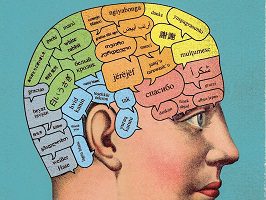Wernicke’s aphasia
Aphasias are conditions of the brain that impact a person’s communication abilities, particularly speech. Wernicke’s aphasia causes difficulty speaking in coherent sentences or understanding others’ speech. In this article we will discuss the causes of Wernicke’s aphasia .
Wernicke’s aphasia is the most common type of fluent aphasia. It occurs when the left middle side of the brain becomes damaged or altered. This part of the brain is known as Wernicke’s area, named after Carl Wernicke , a neurologist. Wernicke’s area of the brain controls human language . It’s also near where we store our personal dictionaries. Someone with Wernicke’s aphasia may have difficulty processing the meaning of spoken words .
Symptoms of Wernicke’s aphasia
Regarding speech and comprehension, people with Wernicke’s aphasia may:
string words together to make sentences that don’t make sense
makeup words that have no meaning
be unaware of the mistakes in their speech
deliver words in a normal melodic line, even though the content may not make any sense
articulate their words normally
have difficulty repeating phrases
add words when trying to repeat someone
interrupt others and speak rapidly
Difficulty with spoken language may not carry over to other aspects of brain functioning. Aphasia is different from a disease like Alzheimer’s, in which many of the brain’s functions diminish over time. Those with Wernicke’s aphasia may:
have severely impaired reading and writing ability
understand visual materials better than written or spoken words
maintain cognitive abilities other than those associated with language
Causes of Wernicke’s aphasia
The most common cause of aphasia is brain damage resulting from a stroke, that is, the blockage or rupture of a blood vessel in the brain. The lack of blood supply to the brain results in the death of brain cells or damage to the regions that control language .
Brain damage from a serious head injury, tumor, infection, or degenerative process also causes aphasia . In these cases, aphasia usually occurs with other types of cognitive problems, such as memory problems or confusion.
“Primary progressive aphasia ” is the term used for language difficulty that develops progressively. This is due to the gradual degeneration of brain neurons located in the language networks. Sometimes this type of aphasia progresses to a more generalized dementia.
Occasionally, temporary episodes of aphasia may occur. These episodes may be due to migraines, seizures, or transient ischemic attack. A transient ischemic attack occurs when blood flow to a region of the brain is temporarily blocked. People who have had a transient ischemic attack are at increased risk of having a stroke in the near future.
Lesions or damage in the middle of the left side of the brain cause Wernicke’s aphasia .
Stroke is one potential cause of this condition because it impairs blood flow to the brain. If blood does not reach Wernicke’s area of the brain, it can kill brain cells, resulting in this type of aphasia . Aphasia affects 25 to 40 percent of people who experience strokes.
Other conditions that may affect this area of the brain include:
head trauma
tumors
infections
neurological disorders
It’s also possible to have aphasia that comes and goes. This may be caused by migraines, seizures, or other medical conditions.
How it’s diagnosed ( Wernicke’s aphasia)
You should always see a doctor if you suspect you have Wernicke’s aphasia or any type of aphasia. This condition may indicate a significant alteration in the brain. Depending on your diagnosis, you may need to undergo medical interventions for the underlying cause of the aphasia .
Your doctor will need to perform tests to determine what has caused Wernicke’s aphasia . This will likely include brain imaging tests such as an MRI or CT scan. These tests can also help your doctor determine if other parts of your brain have been affected.
It may be necessary to have a neurological evaluation as well as a comprehensive speech and language examination. These tests will help the doctor determine your receptive and expressive language deficits. Some of the tasks may include:
asking you to perform certain commands
asking a question for you to answer
asking you to name or repeat objects
engaging in conversation
testing your reading and writing
Once diagnosed, your doctor may recommend you see a speech-language pathologist who can help you improve your language abilities.
Treatment of Wernicke’s aphasia
Corrective therapy of speech disorders is carried out against the background of treatment of the causative disease: restoration of cerebral circulation, removal of the tumor, elimination of the consequences of TBI, etiotropic therapy of neuro infection. Treatment is carried out in stages, selected individually according to the severity of the disorders, the speed of recovery. The main therapeutic components are:
Speech therapy classesskills begin from the first days or weeks of the illness. Treatment requires patience and perseverance and may take several years. The first priority is to restore phonemic hearing . In the future, therapy is aimed at correcting all speech components: expressive speech, writing , reading.Medication support . Promotes the early restoration of speech function, cognitive abilities, regression of concomitant neurological deficits. It is carried out by nootropics (piracetam, ginkgo biloba ), drugs that improve cerebral hemodynamics, neurometabolites (glycine, B vitamins, gamma-aminobutyric acid).
Speech rehabilitation requires the participation of loved ones of the patient. Establishing verbal contact is of great importance, for this, the speech of others addressed to the patient should be simple, clear, slow. Speech therapy classes should be performed daily, supplemented with exercises at home. Additional rehabilitation measures contribute to a successful recovery: massage, physiotherapy exercises, physiotherapy, psychotherapy.
